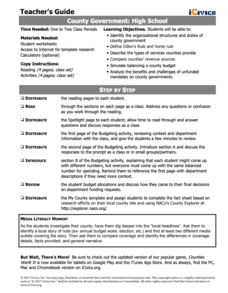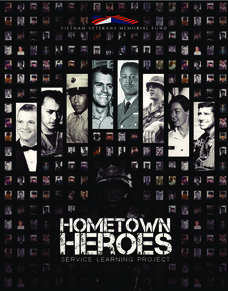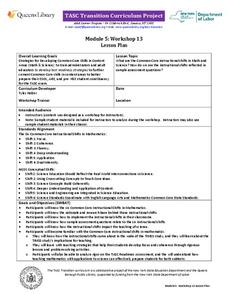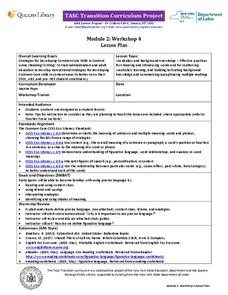Constitutional Rights Foundation
If Men Were Angels: Teaching the Constitution With the Federalist Papers
Much like the methods of group work, the writers of the Federalist Papers worked together to advocate for their viewpoints against the anti-federalists. The resource enables learners to break into small groups and conduct research before...
Smithsonian Institution
Students’ Response to 9/11—A Documentary Report
Young historians research the devastating attacks of 9/11 and use that information to script their own documentaries. The follow-up activity includes recording the documentary and conducting classmate interviews,
Smithsonian Institution
The Soldier’s Experience—Vietnam versus World War I
The Vietnam War and World War I were two very important—and different—wars. To understand the differences, and similarities, class members watch videos, examine primary source documents, and then create a newscast that examines the...
Smithsonian Institution
POWs
Why did Vietnam POWs and their families receive more media attention than POWs in previous wars? To answer this question, class members view artifacts, read articles, and engage in class discussion. Individuals then assume the voice of...
Smithsonian Institution
Cuban Missile Crisis
The United States—specifically John F. Kennedy—played a large role during the Cuban Missile Crisis. A history resource poses questions that encourage critical thinking as well as in-depth analysis of images from the time period.
Smithsonian Institution
Battle of the Bulge: America Responds to a German Surprise
World War II and the Battle of the Bulge are the focus of a history resource. Exercises include analyzing images, writing letters in the mindset of a soldier, and even immersing oneself in a cold experience to better empathize with the...
Smithsonian Institution
Changing Gender Roles on the Home Front
Many historians discuss how gender roles changed because of World War II, but how did this come to be? An informative resource challenges scholars to do some digging and research the information for themselves. They research how...
Smithsonian Institution
Lexington and Concord: Historical Interpretation
Learners view and analyze three different images related to the Battle of Lexington and Concord. They also answer a variety of questions in a graphic organizer to help keep the information straight.
Smithsonian Institution
Two Perspectives on the Battle of Little Bighorn/Greasy Grass
Learners understand why historians conduct research and the importance of perception when it comes to studying history. The resource covers The Wars of Expansion and the Battle of Little Bighorn/Greasy Grass through group work, debate,...
Federal Reserve Bank
The Story of the Federal Reserve: Middle School Lesson Plan
After reading the charming cartoon about the United States Federal Reserve, pupils often need to complete activities to retain their learning. The resource does a wonderful job of using class discussion and various written exercises to...
Federal Reserve Bank
The Story of the Federal Reserve System
Prevent the Federal Reserve System from becoming a dry topic for your middle and high schoolers by using an informative, engaging resource! The cartoon takes your class on a journey with aliens from the planet of Novus to observe the...
iCivics
Tribal Government: High School
Did you know there are 567 federally recognized American Indian and Native Alaskan tribes and villages in the United States alone? The resource helps break down the complexities of many different tribal societies to explain the concept...
iCivics
County Government: High School
Balancing a budget—the bane of many people's existence! Yet, its' something that must be done, especially in government systems. The resource, fourth in a seven-part series exploring local government, focuses on various exercises that...
iCivics
Washington’s Water
It's easy to forget about something as simple as water, a substance that is easily available to many in the world. However, understanding water management and the importance of a renewable resource system becomes clear in an informative,...
Federal Reserve Bank
Once Upon a Dime
The story of "Once Upon a Dime" starts like any other fairy tale, but it quickly becomes a story about the value of money and the economic system commonly used before it. Presented as a cartoon, the resource consists of dialogue between...
Cave Creek Unified School District
Crusades and Culture in the Middle Ages
The Crusades sounds like a glamorous time period in the Middle Ages full of glory—but was it? Scholars find and review the truth of the Crusades' influence on the world through the resource. The study guides, separated individually by...
US Holocaust Museum
Time Capsule in a Milk Can
Imagine dumping out a milk can and finding letters from one of the darkest moments in history! Scholars use Holocaust Reading Passages and research to discover how people recorded and hid history during the events of World War II. They...
Council for Economic Education
Satisfaction Please! (Part 1)
The topic of consumerism seems easy to those who participate actively in the US economy, but pupils who are new to economics may see the idea as foreign. Help them understand their rights as consumers and what to expect when interacting...
Vietnam Veterans Memorial Fund
Hometown Heroes
Transform studying about veterans in a textbook to personal interviews with veterans in the community. Four varying lesson plans make up an entire unit or individualized learning based on your class's needs. Exercises include researching...
New York State Education Department
TASC Transition Curriculum: Workshop 13
The six instructional shifts in this workshop definitely move math and science teachers' understanding of instruction. The workshop, 13th out of a series of 15, asks participants to examine sample tests and to look at how the six...
New York State Education Department
TASC Transition Curriculum: Workshop 11
You'll C-E-R a difference in classroom achievement after using a helpful lesson. Designed for economics, civics, government, and US history classes, participants practice using the CER model to craft arguments about primary and secondary...
New York State Education Department
TASC Transition Curriculum: Workshop 4
Why is it important to use precise language? Participants explore this question in the fourth activity in a series of 15 on effective instruction. Perfect for all content areas, the activity promotes appropriate language choice through...
Facing History and Ourselves
Life for German Youth in the 1930s: Education, Propaganda, Conformity, and Obedience
The German youth faced an onslaught of propaganda when they went to school, thanks to the Nazi regime led by Hitler during World War II. Pupils relate their education experiences to German youth by analyzing primary source readings,...
Global Oneness Project
Repairing the Fabric of Democracy
During elections, headlines constantly lament the issue of low voter turnout. Help class members understand why this is such an important topic with relevant articles, a discussion of both sides of the issue, and a reflective essay.

























